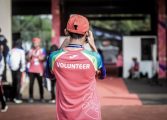By Heather Michon
Correspondent
Deep in the remote mountains of northern Haiti, roads are passable only by foot or by mule. Residents of the region have no electricity, no running water, and almost no access to the outside world by phone or internet.
It is about as different from Lake Monticello as a place can be.
But one Lake resident has long been on a mission to improve life for the people of these rugged mountains.
Dr. Sue Carlson is the executive director of the Raising Haiti Foundation, a volunteer organization based in Arlington that partners with Haitians to bring economic and educational resources to the nearly 40,000 people who live in and around the small town of Medor, about 30 miles north of the capital of Port-au-Prince.
Carlson became involved with the region in the late 1990s, when her church, Our Lady Queen of Peace in Arlington, joined a ‘parish-twinning’ program with St. Joseph Church in Medor.
Over the next 20 years, she made more than two dozen trips to the region. She helped coordinate the medical and education programs that would eventually form the nucleus of the Raising Haiti Foundation.
“I didn’t think this is what I’d be doing in retirement,” she said. “But it’s become the most fulfilling work of my life.”
Raising Haiti
Carlson was no stranger to the international relief community, having brought her skills as an ophthalmologist to medical missions in Africa, Asia, and South America throughout her career. Over the years, she performed at least 800 surgical procedures that restored sight to impoverished cataract sufferers.
The Raising Haiti Foundation has a broader scope. Its goal is to “empower communities to help [people] lift themselves up through something we call the 3LEGS program,” she explained. “There’s a proverb in Haiti that a stool can’t stand up without three legs. The ‘three legs’ of sustainable development are community organizing, education, and economic development.”
Tree currency
This includes a robust slate of agricultural training programs, livestock sharing programs, a seed collection program, and a tool library that allows farmers access to simple tools like hoes and shovels – tools they would not otherwise be able to afford. “Sometimes people would have to sell their only goat to get a tool, or sometimes they can’t even do that, and they’re trying to dig with their hands or a stick,” she said.
They also sponsor a “tree currency” program to combat one of the region’s most critical issues: deforestation. Lack of tree cover leads to soil erosion that reduces crop yield and to destructive landslides during tropical storms.
“Haiti’s deforestation issue goes back to slavery when French plantation owners forced slaves to cut down trees for their plantations,” Carlson explained.
The Tree Currency program allows farmers to earn credits for planting and nurturing trees. The credits can then be exchanged for seeds, livestock, tools, and educational programs. Facilitators also teach best practices for pruning so families can access firewood without damaging the young trees.
At last count, 287,000 trees have been planted under the program.
Microcredit yields maximum returns
Raising Haiti’s microcredit program, inaugurated in 2020, has also seen significant success.
Microcredit generally benefits women, who often have limited access to funding through other sources. Small loans of $25 to $50 can allow a woman to buy equipment or supplies that allow them to offer goods or services that bring in much-needed income.
Under the foundation’s program, loan recipients are given money and training in business basics. They are formed into “families” of 5-15 to provide support and encouragement, with an elected “mother” who helps coordinate activities.
Carlson tells the story of one mother who routinely spent hours collecting sea salt for sale at the local market – but couldn’t make a profit on such a low-value product. With her microloan and some market research, she could purchase higher-value products like sugar and rice and began seeing a real profit.
The impact of this small loan and the support of her “family” was life-changing for this young woman. She gained status within her community. Her abusive husband began to respect her, and the abuse stopped. Best of all, she was able to send her children to school, where they can gain skills that will help them build their own futures.
Recipients have maintained a 100 percent repayment record. In fact, when one recipient unexpectedly died, the other women in her group gathered their own money and posthumously repaid her loan.
Future
Carlson hasn’t been able to visit Medor since before the pandemic. Between the rigors of the journey and the danger from the country’s gang violence and political instability, she is not sure she will be able to make the trip in the future.
Now retired, she admits she misses being an ophthalmologist, a career that gave her enormous pleasure over many years in practice.
But now, her work with Raising Haiti “has become the work of my lifetime. It’s just so fulfilling to see the impact it has had in the communities we work with.”
To learn more about the Raising Haiti Foundation and ways you can support their mission, visit their website at https://raisinghaiti.org/.




